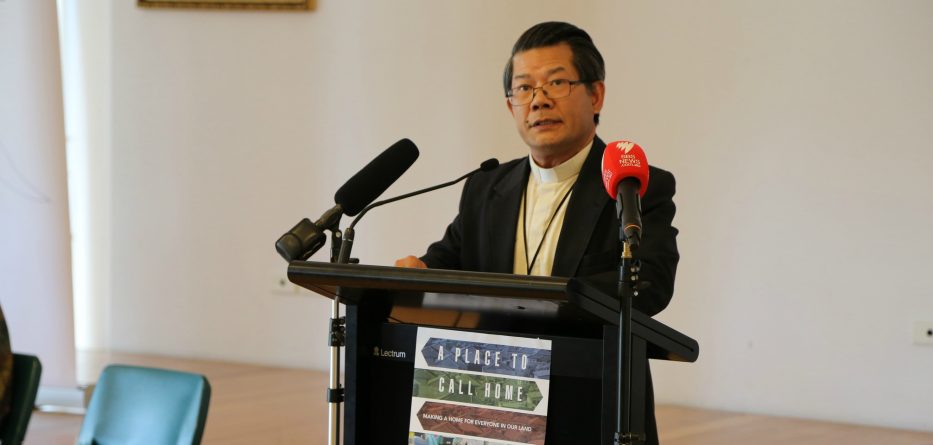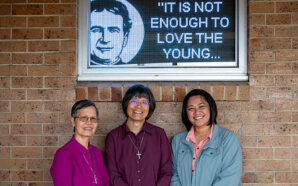Address at the Launch of the 2018-2019 Australian Catholic Bishop’s Social Justice Statement
“A Place to Call Home: Making a home for everyone in our land”
St Patrick’s Cathedral, Parramatta
6 September 2018
Good morning and welcome to St Patrick’s Cathedral Hall, Parramatta. I too acknowledge the Darug people. Let us join in paying respects to the traditional owners and giving thanks for their care and stewardship for this land.
In particular, too, I want to thank Netty Horton and Jack de Groot for their profound contributions to today’s launch.
It is important that we honour the way Netty and Jack have recognised the needs of the most vulnerable in our country and have worked so tirelessly for our brothers and sisters in need.
In their commitment we see a heartfelt response to the Biblical call for justice based on our common dignity as God’s children and a determination to deal with the root causes of homelessness.
Working alongside Netty and Jack are many others in the Church who are also trying to confront Australia’s housing crisis and to alleviate the scourge of homelessness. We should pay tribute to the diocesan social service agencies, the lay associations including the Society of St Vincent de Paul, members of Religious Orders, and initiatives such as the Mercy Foundation, the Sacred Heart Mission and the Australian Catholic Housing Alliance.
There is the dominant narrative about the Church as an institution – one that is not necessarily “fake news” or Fox News, but it nevertheless does not do justice to the role of ordinary Catholics. It is this institutional Church often disconnected to the base that has been accused of lacking in love, compassion and even acting with hypocrisy, especially in relation to victims of sexual abuse.
In the spirit of humility and repentance, we leaders of the institutional Church need to convert to the grassroots, the coalface and together with all the baptised we follow the compassionate Jesus and become the sacrament of God’s inclusive love for all.
Together we can reclaim the Church that shines as a beacon of hope for the world, the Church that has no equal on the planet in terms of its outreach to the poor and the marginalised, the Church that makes present the gentle reach of God’s hand affirming, healing, strengthening and uplifting one another and especially those in need.
The Gospel teaches us that God has an eye for the outsiders and those who are in any way marginalised by society. In Jesus, God champions the cause of the socially insignificant, despised and excluded. Their dignity becomes the object of God’s concern and action in the world. As we observe Jesus’ encounters and interactions with them, we are challenged to examine our own sense of comfort and entitlement and ultimately to measure ourselves according to God’s inclusive vision.
The Parable of the Good Samaritan is an example of how Jesus challenges the way we think and act. Samaritans and Jews did not get along. Yet in the parable told in front of a Jewish audience, the Samaritan is recast as the decent human being who acted with compassion and generosity vis-a-viz the plight of another fellow human being. Not only did he put himself at risk by coming to the aid of a stranger, he spared no expense for the latter’s wellbeing. The priest and the Levite who were considered the respected class of society and the custodians of tradition failed the test of a good neighbour. They put tradition and law in the way of basic human decency. Thus, in crafting the characters in their cultural and religious context, Jesus questioned the prevailing assumptions and stereotyped attitudes. The thresholds of vulnerability and insecurity were infused with graced opportunity and possibility. We are called like the Samaritan to minister at these thresholds.
Netty and Jack have spoken about some of the groups who are particularly vulnerable to homelessness and housing stress. Let me speak out about one group in particular: the people seeking asylum who are living in the community in Australia. Until recently, as part of what is known as the Status Resolution Support Service, they have been receiving an amount equivalent to 89 per cent of the Newstart Allowance. And as we know, the Newstart Allowance is well below the poverty line. But since late last year, the government has been classing many of these people as ‘work ready’ and clearly plans to make the same decision for many more. That means that such people will have 28 days in which to find work before even that meagre allowance and associated support are cut off.
If this policy takes full effect, over 7,000 people seeking asylum will find themselves suddenly without any support at all. We all know how hard it is to find a job at the best of times, but people with limited skills and with little English will find it much harder. If you are a single parent, or are suffering from mental illness, or if your legal status is questionable or precarious, the task of finding and keeping employment becomes many times harder again.
Asylum seekers, strangers in our land, are depending on this support to keep a roof over their heads as well as to feed and clothe themselves and their families. If the support is cut off, the number of homeless in Australia could increase dramatically.
The 2018 Social Justice Statement begins with these words: “Every day in our streets, we, like the Samaritan, see wounded people desperately in need of help. They are the homeless and the lost, injured by misfortune, by violence and by poverty.”
Jesus’ parable shows how one person found the courage to minister at the thresholds of vulnerability and became an agent for change by growing human kindness and generosity. Thanks to him, there was a little community – the Samaritan, the innkeeper and the wounded man. This community was an alternative, indeed a contrast society, to the self-centred and uncaring society at large.
In the face of growing homelessness and housing stress, Australia is called to be a community of hospitality, called not to walk past the thousands whose wounds need binding, but to reach out to them. As Christians, we can be like the Good Samaritan in claiming our agency and transforming our society into a community of genuine human relationships.
God in Christ summons us to live and relate to each other in a way that is different to the kind of ruthless, competitive, inhumane, dog-eat-dog, survival of the fittest economy that we are being seduced into.
We are called to practice an ethic of concern, care, support, for one another so no one is excluded from the table or left behind; we are challenged to build a community of hospitality, compassion and neighbourliness. Let us heed the command of Jesus: ‘Go and do the same yourself’.
We all pray for the strength to do just that.
Most Rev Vincent Long Van Nguyen OFM Conv
Bishop of Parramatta
Chairman, Australian Catholic Social Justice Council








